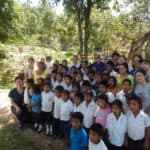Jens sits at our dining room table, our only table, in La Esperanza, as Laura and I explain to him the particular water challenges we face here in Intibucá. Jens, a 17 year old, US born citizen of German heritage, living in Tegucigalpa, Honduras, is visiting with us over the next few days. His older brother Jan, Jan’s friend Aeden, and Mario, a friend of both families and the driver/chaperon for the trip, are all visiting us in our small and modest home. Aeden is home from college in Prague where he studies cinematography. Jan is interested in the same career, but studies at Emory University in Georgia. Shoulder to Shoulder has contracted with Aeden to produce three videos: two will be short ones on brigades and Shoulder to Shoulder in general, and the third will be a documentary on the bilingual school. Presently, we’re trying to arrange a fold out coach and three mattresses on our limited floor space so everyone can sleep. Jens continues to incredulously question us on the water, unwilling to conceive that water runs only every other day. “But, what do you do about that ‘take a shower every day’ rule?” We then introduce Jens to the concept of a bucket shower, a concept he’ll become familiar with over the next three days.
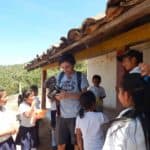
The rural, isolated, poor, frontier region of Intibucá is very unfamiliar to our four guests from Tegucigalpa. You might say that it presents as more foreign to them than it would have even to us when we first arrived. But they have all come with a spirit of openness, acceptance, and generosity. They capture on video the commitment to service in Pinares where Virginia Commonwealth University and Fairfax Family Practice Centers are holding their two week medical brigade. After a morning and afternoon of videotaping there, we drive south toward Concepcion where our guests will stay with us in our home there. It is clear that Mario doesn’t believe me when I tell him that three minutes after leaving Pinares we’ll run out of pavement. When we begin bumping up and down, navigating the trenches where rain has eroded the road, he asks how far to Concepcion. “Maybe ten miles, but it will take us about an hour.” Mario works with the Central American Bank. The Central American Bank subsidized the paving of this road. According to their records, it’s been paved all the way to Camasca. He will register an official complaint report. But our going is slow, not only because of the road, but also because every five minutes or so, Aeden and Jan yell to stop the car. They grab their equipment and jump out of the car. They take beautiful shots of the expansive terrain, the majestic mountains, and the awe it inspires. I take this road too often. I no longer recognize the breathtaking views or the bumpy drive.
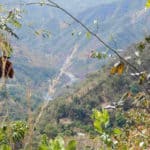
In Concepcion we all settle into our home. There is a lot more space and rooms, but we’re short a mattress. Mario disappears for a short time, and, unbeknownst to us, borrows a mattress from our neighbors. We tell the boys there is always water at night, but we often lose it for a few hours in the morning. They take no heed to our warning. In the morning, as they take their bucket showers, Laura and I are holding back our laughter as we watch them throwing cold water from our pila onto their bodies. So energetic and enthusiastic, so bright and ready to take on the world. With the medium of video, they will make art, their free expression to inspire.
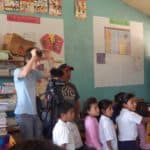
We head to Camasca and the bilingual school. Here, they are recording a view of hope. The parents send their children to our school with a great hope of something new, of achievement, of a better day. I can’t help think about those expansive, limitless views of the mountains from yesterday. Ironic, here where boundless beauty is so easily witnessed in nature, the constraints of poverty are so clear. Poverty limits experience, limits the horizon. Aeden films Juan Carlos and Keilyn, two cousins who live two-hundred meters below the town proper. They don’t have much, but they do have a climb up a great hill every morning. It’s a rugged climb and I feel some shame for my self pity that the road I travel is not paved. The path Juan Carlos and Keilyn take is one with carved footholds into a slate, rock face. They climb, we climb, we film, we record, and this is hope. It springs upon us when we reach the summit, an opening appears. Then we’re at the school.
Some of us have been given much, some of us, little. But all of us have rutted roads to travel, and all of us can gaze upon the expansive beauty of our world. Can not all of us then pattern hope? We can remember and record. We can share. It is not so important from where we start our journeys, but the integrity of the journey is the clear testament of hope.
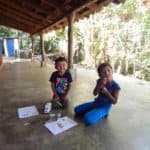
A Child's Valuable Lesson
His name is Valentino (yes just like the bygone, heart throb, movie idol). These days, he’s hanging out with the second graders at the Good Shepherd Bilingual School. He’s only six and the other children in the second grade classroom are seven or eight. But he’s tall for his age, his English is excellent, and so in many ways he fits right in. He’s energetic, very outgoing, and makes friends easily, both among his peers and adults. He’s at ease in this environment, even though it is not the one in which he was born and raised. He’s from Ohio and he’s only been in Honduras for three to four months. He gives pause to any adult looking on because he sticks out like a sore thumb. His fair hair and eyes, his Mohawk haircut, his height, and other subtle characteristics give him away as not from here. But he doesn’t know and doesn’t care. He likes it here. The other children flock around him. Perhaps we might want to think he has a magnetic personality. He does, I think, but the reason he attracts playmates and friends has little to do with his personality. He’s different, and as much as he wants to learn about them, they want to learn about him. Every day is a new adventure of discovery and fun.
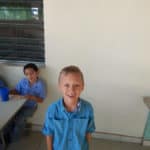
Children simply don’t have the inhibitions that adults suffer. Even though we think it natural to stiffen when confronted with the unfamiliar, it’s really simply learned behavior. A new language, a new environment and culture, new ways of thinking, feeling, and relating, are not really burdens or obstacles to be overcome, but rather opportunities for enrichment. Children know this innately, and we adults can learn a great deal in watching them. We’d probably have a lot fewer wars, and build a lot fewer walls, physically as well as in our minds and hearts, if only we would heed the lesson Valentino has to teach us. Fear is a learned response. It has its place. It can protect us. But it is not our natural response. Our natural response, our instinct if you will, is to connect. Something it seems that Valentino and his playmates at the Good Shepherd Bilingual School achieve with ease and grace.
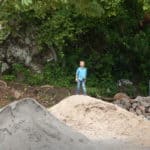
Valentino’s background, his family influence, also has something to do with his disinhibition to be sure. His mother, Jessica Lynn Lemus-Donahue, has been volunteering at our bilingual school since March. She met her husband, Edman, originally from Camasca, Intibucá many years ago in Ohio and were married in 2011. They brought Valentino into the world, followed by Penelope, now age 2.” Jessica had been working, and continues to work part-time via the internet, as a paralegal dealing with immigration law. That is where she learned her flawless Spanish. She told us that she had never been to a Latin American country except for one visit in which she brought the two-year old Valentino to visit her mother-in-law in Honduras. It’s a little difficult for me to believe this as she seems to fit in so seamlessly here. Just like her son, the children at the bilingual school flock around her. They usually try to speak Spanish with her, but she gently responds in English, and solicits them kindly to converse in English. She’s been a great asset to the school, mostly with our kindergarten class where she spends most of her time. She has that rare gift found among teachers of excellent quality. Her approving smile is always present, never judging or critical, but always calling forth the best from her students. She initiated a behavioral, color-coded chart for each student. On the day we visited the kindergarten class, each child presented her with their chart. She told them their color for the day. Most got green, meaning their behavior was excellent. With pride they colored in their day, readied to take them home, show their parents, get their signature, and bring them back on the next school day.
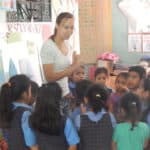
We were so impressed with the children’s acceptance of Jessica, and Jessica’s acceptance of them. For Valentino, it seems the apple has not fallen so far from the tree. After class, we enjoyed a brief lunch with Jessica. The family’s trip to Honduras, and their stay with relatives in Camasca, is in order for Edman to obtain his legal immigration status in the US. In as much as they are married, there is little doubt that Edman will obtain legal status. Still, Honduras loves bureaucratic procedures and it is unclear as to when all the mountains of paperwork will be processed. Perhaps with luck, all will be complete in the Fall. For Shoulder to Shoulder and the school, we wish the couple every success, but we are equally happy that Jessica is able to volunteer through the end of the school year in November.
In planning their trip, Jessica knew she wanted to do something meaningful here in Honduras. She searched the internet and found Shoulder to Shoulder. Not surprising really, as we are one of only a very few charitable organizations here in the Frontera. Besides her work at the school, Jessica has started a Pilates exercise and workout class for the local women in Camasca. It gives the woman a moment of healthy time away from the demands of the household. She seems pleased to be doing something of meaning and purpose while she’s here. The kids seem to love her, and she is certainly dedicated to the children and their families. More than anything, we are grateful for her generosity and commitment.
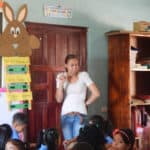
We are always looking for native English-speaking volunteers at Good Shepherd School. On the face of it, it is simply a great asset to have native English speakers in the classroom with the kids. To hear English spoken well and to converse goes such a long way towards helping our children achieve a bilingual competence. This will be of great asset to them, providing them with opportunities they would otherwise not have had. Still, Valentino and his mom show us that the value of their presence among us is so much more than simple linguistic competence. It’s really about making connections. Connections yield understanding. Understanding brings about just relationships. Just relationships secure peace. The children at Good Shepherd Bilingual School, Shoulder to Shoulder, and the people of Camasca are enriched for the presence of Jessica, Edman, Valentino, and Penelope. Thank you for making your home among us.
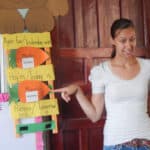
Pickups and Bubbles: An Elusive Measure
Let’s see. Twenty-three participants, eleven translators (four were leaving on that day, so there were four extra in the morning), two brigade coordinators, and two drivers, I think that is thirty eight. Okay so maybe it was thirty-seven or thirty nine, I didn’t actually count. The Virginia Commonwealth University / Fairfax Family Practice Center Brigade at Pinares, San Marcos de la Sierra, set out that Tuesday morning for two smaller communities: Cedros and Las Marias. So everyone packed into two pickup trucks. For the sake of argument, let’s just say nineteen in each pickup. Okay, so each pickup did have an extended cab. They probably squished seven into each cab. That meant that each pickup bed held about twelve persons, plus medications, supplies, and everybody’s lunch.
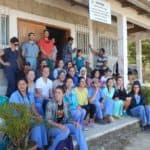
We followed behind them in our comfortable Toyota Land Cruiser. Comfortable perhaps, only by comparison, because we were six persons and a ton of gear. Shoulder to Shoulder had contracted with Aeden O’Connor, a twenty year old cinematography student from Tegucigalpa studying in Prague, to produce some video documentaries on our mission. They were a crew of four with Laura and I along as guides. We watched the pickups travel slowly in front of us, a partially comical, partially surreal scene. They traveled slowly, for safety as much as necessity, and we wondered about the incredible strain on those vehicles so weighted down. We traveled about two miles north, back toward La Esperanza, on the half gravel, half paved “highway,” before taking a left on the access road toward the two smaller communities. The one lane rock and gravel path twisted, rose, and fell along mountainous terrain. The road, literally carved out of the mountain ledge, meant a wall of rock to the right, and, to the left, the sheer two, three, or four hundred foot drop to the base of the mountain. We actually never got that far away from the main highway, it always remaining in sight less than a mile to the east. But, the rugged terrain and weighted vehicles could all but inch and crawl toward our destination. One truck continued straight on as we followed the other to the left and the community of Cedros. But we never really saw any community per se, a single house here and there along the road. Most of the inhabitants don’t live along the road, nor do they live in any community. Their houses are scattered and hidden under the pines, no electric lines running overhead, accessible by foot paths descending and ascending from the road. The entirety of the drive is a short distance, no more than four miles, but it takes about thirty minutes. We arrive at the end of the road at a school, sitting above a huge soccer field.
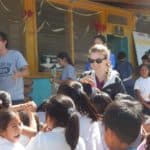
Down to the left of the school is a small church, and just beyond the soccer field, accessible by a footpath, a house. But there is nothing else here. We’re in the middle of a forest. Still, the children are waiting for us, forty or fifty of them. Where did they come from and how did they get here? VCU / FFPC is here for the CHI (Children’s Health Initiative) program. They will take heights and weights, check blood for anemia, check their eyesight, apply varnish to their teeth, and give a few other tests. They set up something of an assembly line to do this efficiently. But the kids are already involving themselves with the fair-skinned, English-speaking guests. Some are playing soccer and others are circling about Aeden, his film crew, and the camera. Two young women from the brigade take out bubble bottles and start blowing bubbles into the air. The kids gather around them, clapping at them and jumping up to try to catch them in their hands. A few of them attempt to blow the bubbles themselves, but they haven’t mastered the art. Most of them have probably never seen soap bubbles. Unless they were fortunate enough to go to a town fiesta in San Marcos, there would be no opportunity to buy them. Even so, very few of their families could afford such a luxury item. The kids are bright-eyed, joyous. Their laughter and their smiles, so inviting and uninhibited, transform this humble school yard into a magical fantasy world. The adults are smiling too, unconsciously, almost as if they are dreaming. I am happy to think that Aeden is getting it all on video.
Some will cynically question the worth of a brigade. Twenty three Americans from the medical and academic world, many of whom don’t speak any Spanish, all coming from a world far removed from the realities of Cedros, visit for two weeks. Will they have any lasting effect? Will they have any real impact on the enduring poverty? I suppose if the assessment of the value of such a trip is only to be judged by empirical metrics, the cynics will be justified. But bubbles, laughter, and smiles defy empirical measurement. The good that is achieved, both for the Hondurans as well as the brigade participants, is not a value of the head, but one of the heart.
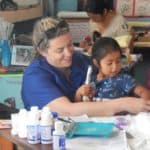 The small encounters will be remembered. Enrichment, empowerment, development, and meaningful growth are not so much a measure of what is given or taken, but rather found in the elusiveness of what is shared. VCU / FFPC came with two physical therapy doctoral students. Though I may be mistaken, and my apologies if I am, I cannot recall physical therapy being part of any other brigade. With the severity of muscular-skeletal, chronic conditions resulting from accidents and the abiding conditions of exhaustive, physical labor, how important is this discipline here in the Frontera. The two therapists saw an incredible amount of patients and offered them solutions and relief that they would not otherwise have discovered. Both of them related the story of one man. As they told the story, their faces beamed as they choked back tears. The man had suffered a stroke and was partially paralyzed. He walked only with great difficulty and effort. They created for him a sling to secure under his foot. With his arms he could hoist his lifeless leg and swing it forward. They practiced with him and soon the man had mastered the maneuver. His life had completely changed by this simple gift of their knowledge. He would no longer be confined and dependent. He would no longer feel himself a burden to his friends and family. He could walk under his own power. What a gift!
The small encounters will be remembered. Enrichment, empowerment, development, and meaningful growth are not so much a measure of what is given or taken, but rather found in the elusiveness of what is shared. VCU / FFPC came with two physical therapy doctoral students. Though I may be mistaken, and my apologies if I am, I cannot recall physical therapy being part of any other brigade. With the severity of muscular-skeletal, chronic conditions resulting from accidents and the abiding conditions of exhaustive, physical labor, how important is this discipline here in the Frontera. The two therapists saw an incredible amount of patients and offered them solutions and relief that they would not otherwise have discovered. Both of them related the story of one man. As they told the story, their faces beamed as they choked back tears. The man had suffered a stroke and was partially paralyzed. He walked only with great difficulty and effort. They created for him a sling to secure under his foot. With his arms he could hoist his lifeless leg and swing it forward. They practiced with him and soon the man had mastered the maneuver. His life had completely changed by this simple gift of their knowledge. He would no longer be confined and dependent. He would no longer feel himself a burden to his friends and family. He could walk under his own power. What a gift!
So light these bubbles in the air that drift above and beyond us, so seemingly insignificant. Yet it is this lightness that holds a world of magic, the wonder and mystery of all that is discovered in sharing.


